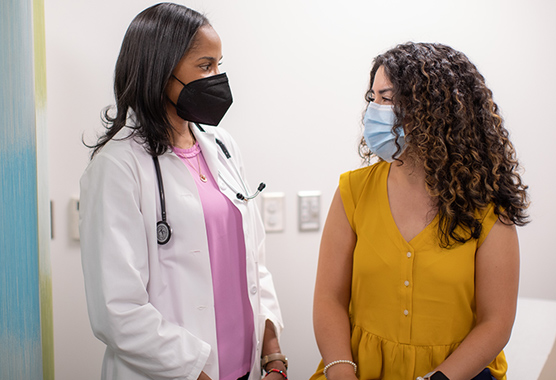Emerging and Reemerging Infectious Diseases
Our infectious disease team offers expert care for infectious diseases that may be more difficult to treat. We protect your health while minimizing the spread of infection.
Medically reviewed by Angel Desai, M.D. on Dec. 04, 2023.

Experts in Emerging and Reemerging Infectious Diseases
The nationally recognized UC Davis Health Division of Infectious Diseases offers advanced care for emerging and reemerging infectious diseases. We specialize in treating drug-resistant infections and those that pose a public health threat.
Our Difference
Comprehensive Patient Care
Emerging infectious diseases can affect your entire family. Our adult and pediatric infectious disease specialists help ease symptoms while minimizing the risk of infection spread.
Travelers Clinic
Experts at our Travelers Clinic provide education, vaccines and preventive therapies for international travelers. These measures can minimize your risk of getting sick with an emerging or reemerging infectious disease when visiting other countries.
Specialized Services
We have dedicated programs aimed at controlling emerging infectious diseases that occur in hospitals and group care settings. We also specialize in treating drug-resistant infections.
What Are Emerging and Reemerging Infectious Diseases?
Infectious diseases spread from person to person. An emerging infection may be a new disease like COVID-19. Or it may be a known disease that starts spreading again or doesn’t respond to standard treatments. Reemerging infectious diseases come back after being mostly controlled.
Common Emerging and Reemerging Infectious Diseases:
Candida auris (C. auris)
C. auris is a fungal infection that may require several different antifungal medications. The fungus can enter your bloodstream, causing a life-threatening infection. It mostly affects hospitalized patients and those who have breathing tubes, feeding tubes or catheter lines.
COVID-19
COVID-19 is a contagious respiratory infection that affects your lungs and breathing. Older adults and those with weakened immune systems may get pneumonia and other life-threatening complications. Vaccines protect against COVID-19.
Measles
Measles is an extremely contagious reemerging viral infection. It causes a rash inside your mouth and all over your body, as well as a high fever, cold-like symptoms and watery eyes. The virus spreads in droplets when you cough or sneeze. It can live on surfaces and in the air for up to two hours. The measles vaccine largely eliminated this infection in the U.S. But unvaccinated, infected people can spread the virus to others who aren’t vaccinated.
Mpox
Mpox (formerly called monkeypox) is a viral infection that causes a rash, fever, cold-like symptoms and extreme fatigue. The rash can affect your face, chest, hands, feet and genitals. It spreads through skin-to-skin contact. The mpox vaccine lowers your risk of getting sick and having severe complications.
Tuberculosis (TB)
Tuberculosis (TB) is a reemerging infectious disease. You can get sick after breathing the bacteria into your lungs. TB causes a severe cough, chest pain and fever. You’re more at risk if you travel to certain parts of Africa, Asia and Eastern Europe where the disease is common. The disease also spreads more easily in group living environments, such as shelters, dormitories and prisons.
Whooping Cough (Pertussis)
Whooping cough (pertussis) is a highly contagious bacterial infection that causes intense coughing fits. It’s especially dangerous to infants and young children. This reemerging infectious disease is on the rise among people who aren’t vaccinated.
Causes and Risk Factors of Emerging and Reemerging Infectious Diseases
Many new emerging infectious diseases occur from human contact with infected animals. The disease then spreads among people. Certain risk factors can cause known diseases to reemerge, including:
Drug Resistance
Some bacteria, viruses and fungi that cause infectious diseases stop responding to the medications that used to destroy them. Drug resistance makes it harder to cure infections and stop diseases from spreading.
Global Travel
Certain infectious diseases like TB and malaria are more common in countries that don’t have good access to quality medical care. People who travel to these countries may unknowingly become infected and bring the illness home with them.
Lack of Vaccination
Adults who put off or don’t get vaccinations for themselves or their children can get and spread vaccine-preventable infections like measles, polio and whooping cough.
"Signs and Symptoms," Centers for Disease Control and Prevention (CDC), https://www.cdc.gov/measles/symptoms/signs-symptoms.html
"Transmission of Measles," CDC, https://www.cdc.gov/measles/transmission.html
"Measles Elimination," CDC, https://www.cdc.gov/measles/elimination.html
Request an Appointment
As Sacramento's No. 1 hospital, you'll benefit from unique advantages in primary care and specialty care. This includes prevention, diagnosis and treatment options from experts in 150 specialties.
Referring Physicians
To refer a patient, submit an electronic referral form or call.
800-4-UCDAVIS
Patients
Call to make an appointment.
Consumer Resource Center
800-2-UCDAVIS

Ranked among the nation’s best hospitals
A U.S. News & World Report best hospital in cardiology, heart & vascular surgery, diabetes & endocrinology, ENT, geriatrics, neurology & neurosurgery, and pulmonology & lung surgery.

Ranked among the nation’s best children’s hospitals
U.S. News & World Report ranked UC Davis Children’s Hospital among the best in pediatric nephrology, orthopedics*, and pulmonology & lung surgery. (*Together with Shriners Children’s Northern California)

Ranked Sacramento’s #1 hospital
Ranked Sacramento’s #1 hospital by U.S. News, and high-performing in aortic valve surgery, back surgery (spinal fusion), COPD, colon cancer surgery, diabetes, gynecological cancer surgery, heart arrhythmia, heart failure, kidney failure, leukemia, lymphoma & myeloma, lung cancer surgery, pacemaker implantation, pneumonia, prostate cancer surgery, stroke, TAVR, cancer, orthopedics, gastroenterology & GI surgery, and urology.

The nation’s highest nursing honor
UC Davis Medical Center has received Magnet® recognition, the nation’s highest honor for nursing excellence.

World-class cancer care
One of ~59 U.S. cancer centers designated “comprehensive” by the National Cancer Institute.

A leader in health care equality
For the 13th consecutive year, UC Davis Medical Center has been recognized as an LGBTQ+ Healthcare Equality Leader by the educational arm of America’s largest civil rights organization.

